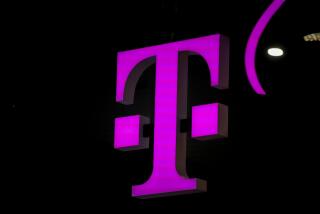Sprint to buy Virgin Mobile
Sprint Nextel Corp. said Tuesday that it was buying Virgin Mobile USA Inc. for $483 million, further narrowing the range of consumer choices for prepaid cellphone service.
Sprint said it would pay $5.50 for each Virgin Mobile share and assume up to $205 million in debt. Payment will be mostly in Sprint shares. The Overland Park, Kan., company already owns 13.1% of Virgin Mobile, which operates its cellphone service over Sprint’s network.
The deal is subject to regulatory approval and the approval of Virgin Mobile’s shareholders. Sprint said the deal, which it expects to complete late this year or in early 2010, should enable it to make further inroads into the fast-growing market for prepaid cellphone service.
Sprint is the third-largest of the four major wireless carriers, which together control about 90% of the cellphone market. It trails AT&T; Mobility and Verizon Wireless; T-Mobile USA is fourth.
“Prepaid is growing at an unprecedented rate with consumers keenly focused on value,” Sprint Chief Executive Dan Hesse said. “Virgin Mobile is an iconic brand in the marketplace that will complement our Boost Mobile brand.”
Virgin Mobile shares were up 25% on Tuesday, jumping $1.07 to close at $5.28. The company went public in October 2007 at $15 a share. Sprint climbed 4 cents to close at $4.59.
Virgin Mobile is the sixth-largest provider of prepaid cellphone services, with 5.2 million customers, and the second-largest “virtual network” provider -- meaning it uses another company’s network to transmit its calls.
But it lags far behind industry leader Tracfone Wireless Inc., which has 12.5 million subscribers, and it has been locked in a price war this year while losing customers.
Prepaid plans were pioneered largely by Virgin Mobile and other mobile virtual network operators, which used pay-as-you-go and inexpensive monthly plans as the hallmark of their competitive strategy.
But such operators have had a particularly difficult time in the U.S. making a business by leasing wireless spectrum from the four major providers and then competing with them. Such labels as Disney, ESPN and Amp’d Mobile have fallen as the network owners ramped up their own prepaid efforts.
The virtual network model has been more successful in Europe, where regulations encourage competition.
“Virgin has been having difficulty getting traction in an increasingly competitive prepaid environment in recent quarters,” Stifel Nicolaus analyst Christopher King wrote in a report Tuesday.
Part of the problem has been its partner, Sprint, which unveiled a $50-a-month plan for its prepaid Boost service in January, undercutting Virgin Mobile’s $80-a-month offering. King noted that Virgin Mobile launched a $49.99 monthly plan in April, but Tracfone recently unveiled a $45-a-month plan of its own.
“Virgin Mobile felt compelled to sell because its customer base was declining, the prepaid space is getting much more competitive, and it faced a $100-million debt maturity at the end of next year that we do not believe it had enough free cash flow to pay off,” analyst Walter Piecyk of Pali Research wrote in a report.
The number of prepaid cellphone providers has been shrinking as bigger players buy up smaller rivals. A year ago, for instance, Virgin Mobile bought Helio, a small Westwood joint venture between EarthLink Inc. and South Korean cellphone carrier SK Telecom.
Helio brought to market an upscale device that brought the advanced features of South Korean cellphones to the U.S. market.
British billionaire Richard Branson’s Virgin Group owns 28.3% of Virgin Mobile. SK Telecom has a 15% stake that it received as part of the Helio deal.
Dan Schulman, chief executive of Virgin Mobile USA, is slated to run the combined companies’ prepaid services operations.
--
More to Read
Inside the business of entertainment
The Wide Shot brings you news, analysis and insights on everything from streaming wars to production — and what it all means for the future.
You may occasionally receive promotional content from the Los Angeles Times.










